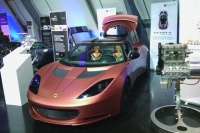It’s not easy to get the average person excited about electric cars, but the buzz at LCV2010 (the low carbon vehicle show) yesterday was palpable.
Millbrook Proving Ground in Bedfordshire was full of major manufacturers, famous designers, bold entrepreneurs and some of the cream of UK engineering talent. Despite all the challenges low-carbon vehicles still face, seeing so much enthusiasm and so many ideas all generated within our small island made you think that an electrified future may not that far off.
Perhaps the main reason that LCV made electric cars seem a more believable proposition was the amount of work being done to integrate them into our existing routines and expectations. Among the usual display of G-Wizs were electric BMWs, fuel cell taxis, hybrid Transits and a zero-emissions police car - a Mitsubishi iMiEV variant identical to the one currently being trialled by the West Midlands force.

Of course drivers still won’t be changing gear, and are unlikely to hear a difference in the engine, but Lotus are hoping their licensed technology will make driving an electric car a more familiar and enjoyable experience to petrolheads - with synthesised engine sounds.
Europe, the US and Japan are all pursuing legislation to establish a minimum noise level for EVs and hybrids. And after nearly being run down by a virtually silent electric bus I could see why. However, as well as projecting sound outside the car to warn pedestrians, Lotus’s technology pipes engine noise around the interior.
Offering a number of settings mimicking different-sized models, the technology uses the road speed to simulate gear changes and give drivers a better idea of what the engine is doing, as well as providing a feeling of greater control. Though some of the sounds were tinny and computergame-esque, others really could have you forgetting you were in anything but a normal car.
Plus the system can be personalised. ’We can make a mundane engine sound like a snarling sports car,’ the Lotus engineer told me, before revealing the ultimate geek toy - the spaceship sound mode.

However good the simulation, EVs will always have requirements that conventional cars don’t, charging being the obvious one. Still, a wealth of British firms are working on making that process faster, easier and cheaper. London-based Pod Point, for example, has introduced the first super-fast charger for the home. Fitted by a regular electrician, it claims to offer full battery repletion typically within three hours. And its sleek circular design fits neatly on the wall of the garage between the fuse box and the hosepipe rack.
Even better is the New Zealand firm that plans to launch a wireless charging system, removing the hazards and hassle of plugging in. And though it’s not a British innovation, it’s a good example of the UK’s strength in the field. When I asked the CEO why he had come here to roll out the product he said it was an obvious choice: Britain had become a hub of activity and expertise for the electric vehicles industry. Looking around LCV, it was hard to disagree with him.




JLR teams with Allye Energy on portable battery storage
This illustrates the lengths required to operate electric vehicles in some circumstances. It is just as well few electric Range Rovers will go off...